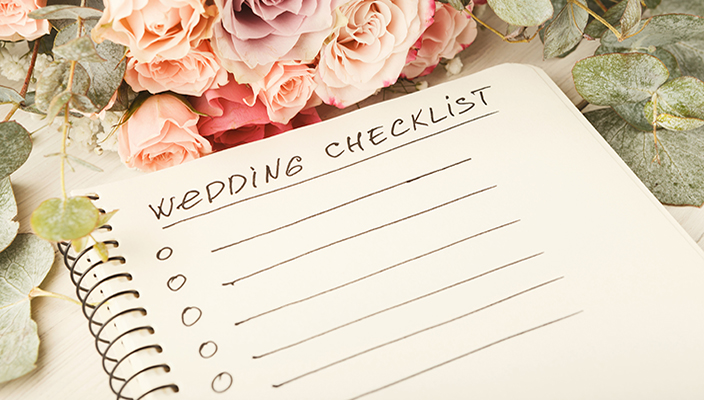
With your wedding day fast approaching and everything seemingly happening all at once, it can be all too easy to overlook small but crucial details. Designated helpers and a plan of action, as well as checklists, will help ensure all your preparations come together beautifully for your wedding.
Designated Helpers
You may wish to delegate specific wedding day responsibilities to one or two reliable friends. For example, put all the items that will be needed for the ceremony in a box or bin and ask one friend to be responsible for it. You’ll want to confirm with your rabbi or cantor beforehand exactly what items are needed and which are optional. When it’s time to set-up for the ceremony, you and your officiating clergy will know exactly who has all the necessary items.
Signing Checklist
You will need these items for the ketubah signing ceremony:
- Civil wedding license: Obtain your wedding license with the local legal authorities (generally the county clerk) in the county where your wedding ceremony will be held. Every state has different rules for what’s required, so be sure to set aside time to research and apply for a wedding license before the big day.
- Ketubah and pen: Some ketubah artists recommend or provide a particular type of pen for signing the document. Consider having your ketubah mounted (but framed after the ceremony), so it will be easier to sign and display on your wedding day.
- or yarmulkes: If you are providing head coverings to guests, consider including bobby pins or clips to help keep the kippot in place.
- set: This set (along with matches, wine, spices, and a Havdalah candle) is needed only for Saturday evening weddings – not only to ritualize the end of Shabbat, but also as a beautiful and sacred transition from the end of one joyous occasion into another.
Wedding Ceremony Checklist
You will need these items for the wedding ceremony under the (wedding canopy)
- Wedding bands: Because your wedding bands are key to the ceremony, make sure the box in which they’re stored is secured or have a trusted attendant hold the rings until they are handed off to the officiating rabbi or cantor.
- for wine or grape juice: Wine or grape juice is sipped from either two or three cups, depending on your clergy’s preference. Sometimes each partner provides a cup that’s special to the family, and the third cup is one they own jointly.
- Small bottle of wine or grape juice: Either red or white is fine for ritual purposes, but if you’re prone to spills, go for the white.
- Extra copy of readings and personal vows: If friends or family will share readings during the ceremony, having an extra copy on-hand, along with a copy of the couple’s personal vows or readings, is advisable.
- (prayer shawl): Some clergy wrap a tallit around the couple when blessing them.
- Glass to break: To contain shards of glass after it is broken, the glass should be in a sealed plastic bag wrapped in a cloth napkin. (Some clergy prefer to use a lightbulb instead of a glass.) You may wish to purchase a special colored glass and pouch and after the wedding, return the broken glass shards to the company to be fashioned into a memento or ritual object, such as the case for a mezuzah.
Don’t forget a box of tissues for each location – for lots of free-flowing tears of joy.
For more information, check out What You'll Need at a Jewish Wedding.
Explore Jewish Life and Get Inspired
Subscribe for Emails